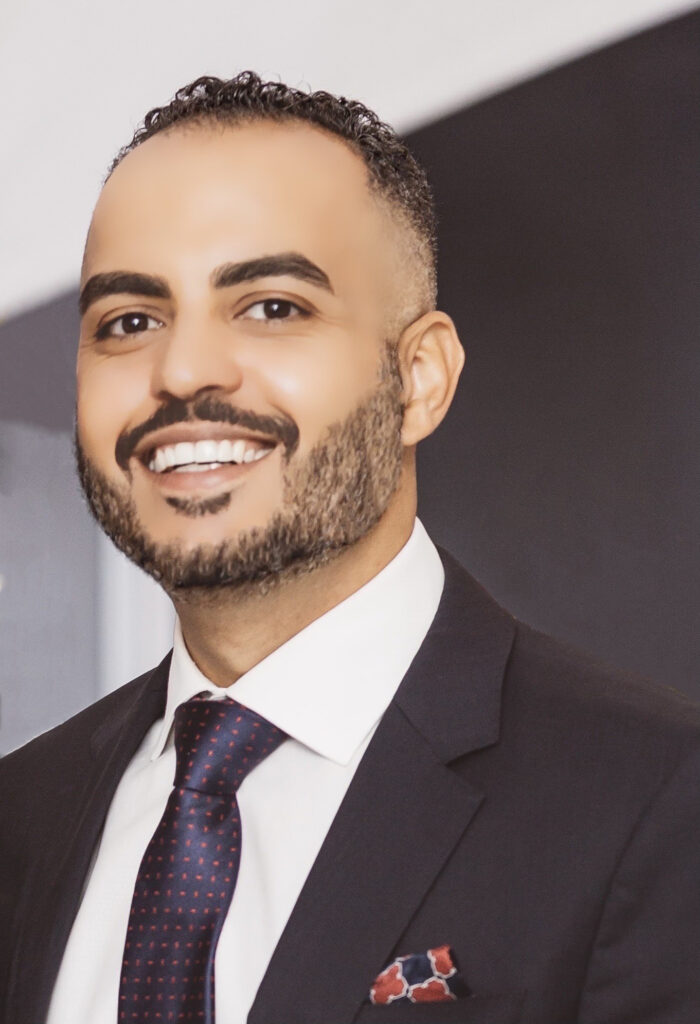
By Elaine Smith
Ahmad Firas Khalid embodies York’s prioritization of advancing the University’s global engagement.
Khalid, a medical doctor and newly hired assistant professor in the School of Global Health, has the global outlook and fluency one would expect of a person born in Jordan and raised in the United Arab Emirates, who attended medical school in the Caribbean, worked in Europe and earned four post-graduate degrees (MD, PhD, MMgmt, MEd, GradCertPHM) in Canada.

He attributes his travels to “curiosity,” always eager to learn more and understand the larger picture. His first real journey abroad took place at 17 after he read an article about Chelsea Clinton, daughter of the former American president, doing an internship at the World Health Organization (WHO) in Geneva. Eager to spend a summer in Europe, the teenager’s next step was finding out what the WHO was and applying for an internship. Dr. Jose Martines, former director of WHO’s Newborn & Child Health department and Khalid’s long-time mentor, took a chance on hiring “the youngest-ever intern at the time” and his “amazing journey with WHO informed who I am today.”
Khalid spent the summer at WHO working in maternal and child health-care community interventions, giving him a glimpse of a health systems perspective that has only deepened over time. It also influenced him to attend medical school, followed by post-graduate degrees in population health, health-care leadership, medical education and health policy in order to satisfy his unending curiosity about the health-care system.
While working on his health policy PhD at McMaster University, Khalid was determined to advance the knowledge on how to get real-time evidence to decision-makers working in health and humanitarian emergencies. His thesis work took him to Jordan and to Lebanon to study the Syrian refugee crisis caused by the civil war in that country.
“I saw first-hand the struggle of Syrian refugees and I was determined to help out by providing the best available evidence to decision-makers to inform their health-care policies for Syrian refugees,” Khalid says.
After graduating from his PhD, Khalid was awarded the prestigious 2021 CIHR Health System Impact Fellowship with the Canadian Red Cross where he is working on implementing efforts to support real-time evidence use in humanitarian practice.
“The fellowship helped me scaffold the work I started with my PhD, making sure that all the Red Cross interventions were informed by evidence, whether they related to COVID-19, long-term care or vaccine clinics,” he says. “It was a chance to bring together my professional experience and scholarly knowledge.”
During the COVID-19 pandemic, Khalid used his medical knowledge and health policy expertise by giving more than 200 media interviews where he simplified complex COVID-19 medical knowledge into easy-to-understand information for the public.
Now, Khalid, who is a member of the board of directors for Médecins Sans Frontières/Doctors Without Borders, is sharing that experience and knowledge with York University students.
“My parents always said that when you know more, you should do and give more,” he says. “I sit between professional practice and research and can intertwine those two worlds for my students.
“I see York University as a hub that combines a multi-disciplinary faculty and a student body with diverse viewpoints that is eager to learn.”
Khalid is happy to call York University home and is excited to bring his worldly views and diverse professional and academic background to his fellow colleagues and students.
“My life is about intention and passion,” he says. “I will deliver the best I can with the resources I have.”
